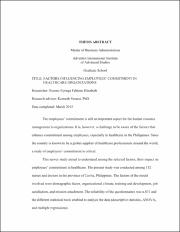| dc.description.abstract | The employees' commitment is still an important aspect for the human resource management in organizations. It is, however, a challenge to be aware of the factors that enhance commitment among employees, especially in healthcare in the Philippines. Since the country is known to be a global supplier of healthcare professionals around the world, a study of employees' commitment is critical.
This survey study aimed to understand among the selected factors, their impact on employees' commitment in healthcare. The present study was conducted among 152 nurses and doctors in the province of Cavite, Philippines. The factors of the model involved were demographic factor, organizational climate, training and development, job satisfaction, and mission attachment. The reliability of the questionnaires was a.831 and the different statistical tools enabled to analyze the data (descriptive statistics, ANOVA, and multiple regressions).
The data analysis found that employees' commitment was negatively related to the level of education (r = -.33). However, gender, age, and the years of experience both within and outside the current organizations were positively and significantly related to the commitment. From the findings, organizational climate, training and development, job satisfaction, and mission attachment are positively and significantly correlated to the employees' commitment. Thus, job satisfaction, and organizational climate had the highest score in the Pearson correlation (.524 and .433, respectively).
From the study, it was concluded that to enhance employees' commitment organizations will need to concentrate on positive organizational climate, training and development, job satisfaction, and mission attachment. Of these, the most important was job satisfaction. The predictive model of this study explained 28% of the employees' commitment in healthcare organizations in the province of Cavite, Philippines. | en_US |

